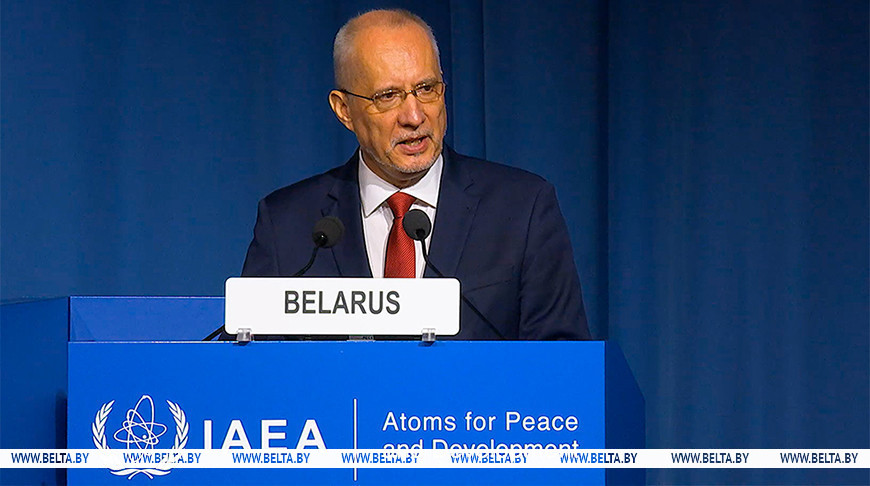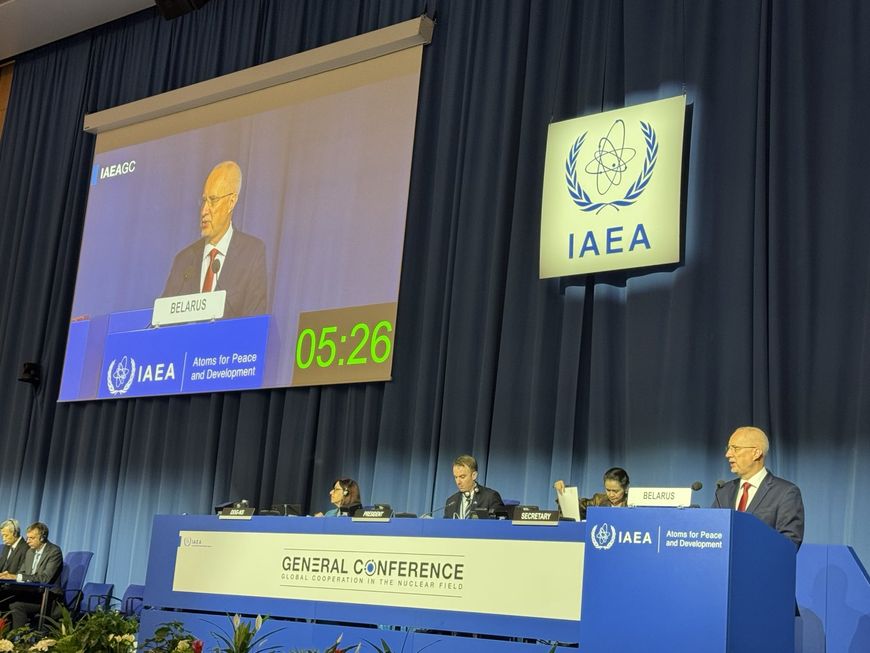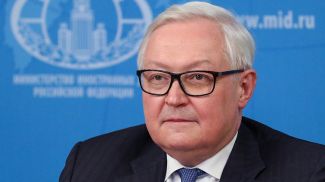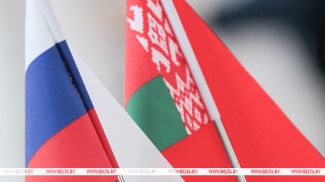
Photo courtesy of the Embassy of Belarus in Austria
MINSK, 16 October (BelTA) – Belarus is open to dialogue with international partners on such a sensitive issue as the death penalty, Belarus' Permanent Representative to the OSCE Andrei Dapkiunas said at a meeting of the OSCE Permanent Council in Vienna on 16 October, BelTA has learned.
“The Belarusian delegation has taken note of the statements by representatives of the European Union and other delegations on the anniversaries of the European and World Day Against the Death Penalty. The position of Belarus on the death penalty has already been presented in this hall. Once again, we draw colleagues’ attention to the fact that Belarusian criminal law provides for the possibility of imposing the capital punishment for 14 criminal offenses, including terrorism, premeditated murder with aggravating factors, crimes against peace, crimes against the security of humanity, and war crimes,” Andrei Dapkiunas emphasized.
“In practice, the death penalty is imposed extremely rarely,” he added.
He stressed that under Belarusian criminal law it is defined as an “exceptional measure of punishment”. This sanction is applied only in exceptional cases and cannot be imposed on women, or on men who committed a crime before the age of 18 or after the age of 65 at the time of sentencing.
Andrei Dapkiunas also pointed out that none of the international human rights instruments to which Belarus is a party, including the International Covenant on Civil and Political Rights, contains a direct prohibition on the use of this form of punishment.
“Nevertheless, in 1996 the question of whether it was appropriate to apply the death penalty in Belarus was put to a referendum. More than 80% of voters supported retaining this form of punishment. Since then, public opinion on this issue has not undergone significant change. Persons sentenced to death have the right to appeal to the president of Belarus for pardoning,” Andrei Dapkiunas emphasized.
“In Belarus' legal system, there have been instances where such petitions have been granted and the death sentence has been commuted to long-term imprisonment. However, such cases are rare, as when a court imposes the capital punishment, the level of public danger presented by the crime is extremely high and the cruelty inflicted on the victims by the perpetrators does not warrant consideration for pardoning,” he continued.
In 2020-2021, as well as 2023-2024, Belarus did not carry out any death sentences. In 2022, however, one sentence was carried out against a criminal who deliberately murdered two elderly people.
In 2024, Aleksandr Lukashenko pardoned German citizen Rico Krieger, who was caught while carrying out a mission for Ukrainian intelligence agencies to carry out a terrorist attack on a Belarusian railway facility. “The reason for showing mercy in this case was due to the convicted person's full admission of guilt, sincere repentance for their actions, and submission of a request for a pardon,” the diplomat explained.
“Belarus is open to dialogue with international partners on this sensitive issue. We continue to carefully study the experience of other states where the death penalty has been abolished, and we are ready to engage with those who are interested in a respectful and professional dialogue,” Andrei Dapkiunas said. “However, we do not intend to blindly follow foreign approaches or consider the European model as the only possible standard of ‘civilization’. Experience has shown that even the very concept of humanity is interpreted differently by us.”
He addressed the participants of the meeting: “For you, dear Western colleagues, the concept of humanity means protecting the lives of those who have committed terrible crimes. In your countries, a terrorist who has killed 77 people is serving his sentence in a comfortable cell with three rooms, including a gym, bedroom, and office. We consider this to be a mockery of the families of the victims and the height of absurdity. Your perception of humanity is to protect the lives of terrorists, serial killers, and maniacs. For us, justice is served when society and the families of the victims receive due retribution, and the punishment matches the severity of the crime.”

“We are convinced that the issue of the death penalty must be resolved taking into account the opinion of the people, who expressed their position in a referendum. Ignoring the will of the public in favor of external pressure cannot be considered a manifestation of democracy,” Andrei Dapkiunas stressed.
“The Belarusian delegation has taken note of the statements by representatives of the European Union and other delegations on the anniversaries of the European and World Day Against the Death Penalty. The position of Belarus on the death penalty has already been presented in this hall. Once again, we draw colleagues’ attention to the fact that Belarusian criminal law provides for the possibility of imposing the capital punishment for 14 criminal offenses, including terrorism, premeditated murder with aggravating factors, crimes against peace, crimes against the security of humanity, and war crimes,” Andrei Dapkiunas emphasized.
“In practice, the death penalty is imposed extremely rarely,” he added.
He stressed that under Belarusian criminal law it is defined as an “exceptional measure of punishment”. This sanction is applied only in exceptional cases and cannot be imposed on women, or on men who committed a crime before the age of 18 or after the age of 65 at the time of sentencing.
Andrei Dapkiunas also pointed out that none of the international human rights instruments to which Belarus is a party, including the International Covenant on Civil and Political Rights, contains a direct prohibition on the use of this form of punishment.
“Nevertheless, in 1996 the question of whether it was appropriate to apply the death penalty in Belarus was put to a referendum. More than 80% of voters supported retaining this form of punishment. Since then, public opinion on this issue has not undergone significant change. Persons sentenced to death have the right to appeal to the president of Belarus for pardoning,” Andrei Dapkiunas emphasized.
“In Belarus' legal system, there have been instances where such petitions have been granted and the death sentence has been commuted to long-term imprisonment. However, such cases are rare, as when a court imposes the capital punishment, the level of public danger presented by the crime is extremely high and the cruelty inflicted on the victims by the perpetrators does not warrant consideration for pardoning,” he continued.
In 2020-2021, as well as 2023-2024, Belarus did not carry out any death sentences. In 2022, however, one sentence was carried out against a criminal who deliberately murdered two elderly people.
In 2024, Aleksandr Lukashenko pardoned German citizen Rico Krieger, who was caught while carrying out a mission for Ukrainian intelligence agencies to carry out a terrorist attack on a Belarusian railway facility. “The reason for showing mercy in this case was due to the convicted person's full admission of guilt, sincere repentance for their actions, and submission of a request for a pardon,” the diplomat explained.
“Belarus is open to dialogue with international partners on this sensitive issue. We continue to carefully study the experience of other states where the death penalty has been abolished, and we are ready to engage with those who are interested in a respectful and professional dialogue,” Andrei Dapkiunas said. “However, we do not intend to blindly follow foreign approaches or consider the European model as the only possible standard of ‘civilization’. Experience has shown that even the very concept of humanity is interpreted differently by us.”
He addressed the participants of the meeting: “For you, dear Western colleagues, the concept of humanity means protecting the lives of those who have committed terrible crimes. In your countries, a terrorist who has killed 77 people is serving his sentence in a comfortable cell with three rooms, including a gym, bedroom, and office. We consider this to be a mockery of the families of the victims and the height of absurdity. Your perception of humanity is to protect the lives of terrorists, serial killers, and maniacs. For us, justice is served when society and the families of the victims receive due retribution, and the punishment matches the severity of the crime.”

“We are convinced that the issue of the death penalty must be resolved taking into account the opinion of the people, who expressed their position in a referendum. Ignoring the will of the public in favor of external pressure cannot be considered a manifestation of democracy,” Andrei Dapkiunas stressed.
“Belarus does not need ‘lessons in civilization’. We follow our own path, based on our national experience, traditions, public demands, and principles of justice. Perhaps this approach deserves the attention of those who like to lecture others. Once again, we reaffirm Minsk’s readiness to discuss this sensitive issue, but only in a respectful, balanced, and constructive dialogue, without pressure, demands, or ultimatums, as was once again voiced in this hall today,” Andrei Dapkiunas concluded.
Photo courtesy of the Embassy of Belarus in Austria













